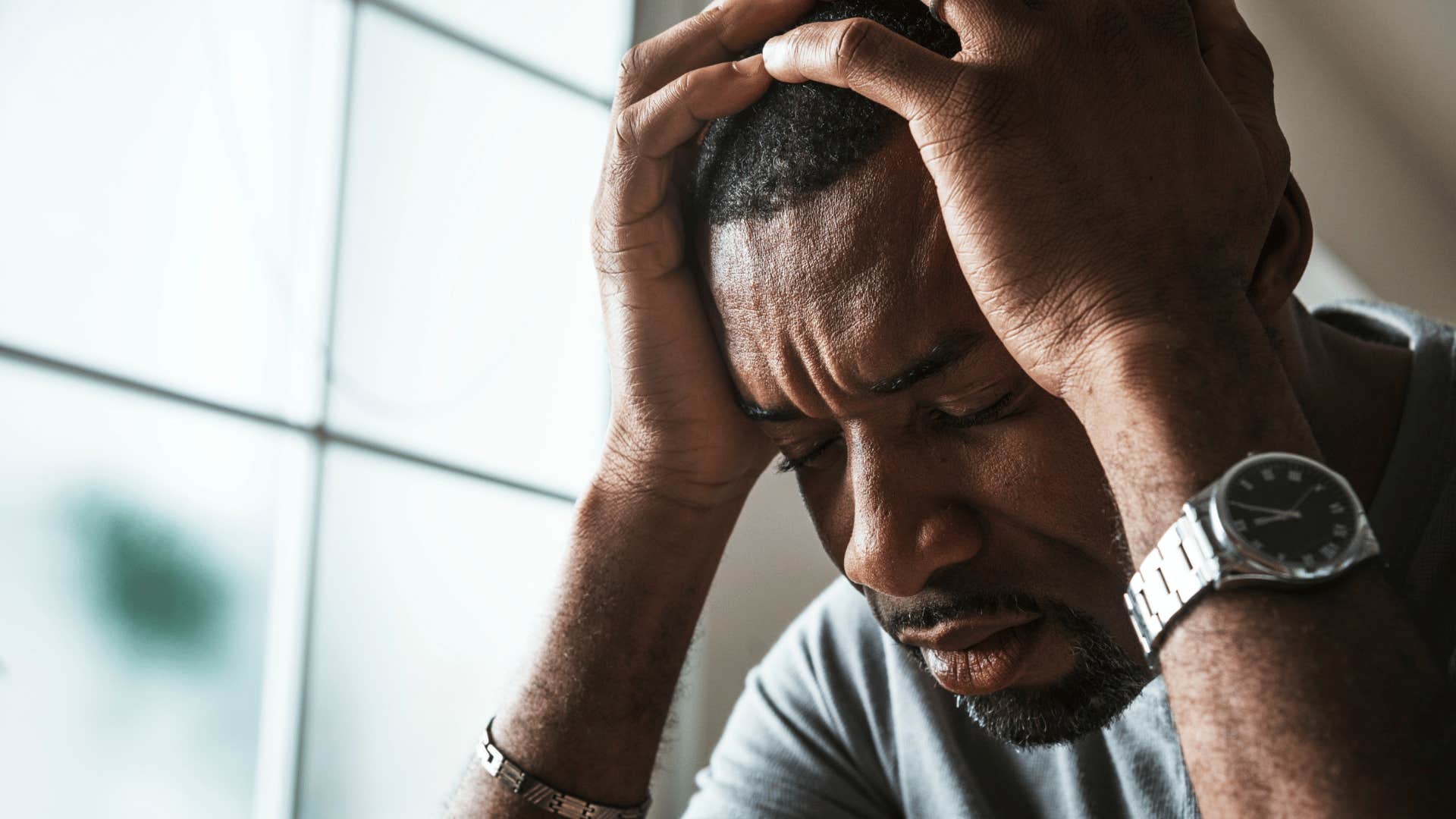11 Phrases Used Often By Fragile People Who Lack Strength And Resilience
People who lack resilience and strength usually become stuck in the same negative patterns.
 Dodokat | Shutterstock
Dodokat | Shutterstock As much as we might wish otherwise, life rarely unfolds the way we expect it to. We all hit unforeseen roadblocks, yet the way we handle those hardships says a lot about our inner strength. Some people crumble under the weight of life's challenges, while others lift themselves up after falling down. They have the innate ability to reframe their struggles as opportunities for growth and change.
There are very specific phrases used often by fragile people who lack strength and resilience, revealing how unsure they are about their place in the world. Their lives are ruled by fear and insecurity. They have a hard time recognizing how capable they really are, which keeps them stuck in a pattern of inaction.
Here are 11 phrases used often by fragile people who lack strength and resilience
1. 'I can't handle this'
 fizkes | Shutterstock
fizkes | Shutterstock
People who feel very vulnerable often say that they can't handle difficult situations. This phrase reflects their core belief that life is too hard for them to manage. Fragile people who lack strength and resilience struggle with self-perception. They believe that getting knocked down means they can't get back up.
Clinical psychologist Jennifer L Keluskar PhD revealed that feeling fragile isn't always a bad thing, noting that "being open to what and how you feel is the entrance ticket for inclusion with humanity." She offered the reminder that "all people carry at least some degree of emotional fragility," and further advised, "Remember that your goal is to buffer the impact of emotions, not to avoid experiencing them."
Learning to handle hard times requires people to reframe how they enter the world and how they see themselves. When they see their self-defeating feelings as facts, they deny themselves the opportunity to grow and change.
2. 'Why does this always happen to me?'
 Rawpixel.com | Shutterstock
Rawpixel.com | Shutterstock
One of the phrases used often by fragile people who lack strength and resilience is actually a question, where they see life as something that happens to them, instead of something they have agency over. They often wonder why bad things always happen to them. They get stuck in their own negative thought loop, which makes it virtually impossible for them to recognize the good parts of life.
Therapist Nancy Carbone pointed out that having a victim mentality keeps people from reaching their full potential and feeling content with their lives.
"When someone is stuck in a victim complex, they can't see that the circumstances and people around them are usually good," she explained. "When good things happen, they tend to ignore or downplay them and instead focus on the negative aspects of the experience."
People who see themselves as perpetual victims "feel they do not deserve the good things in life, looking at the glass half empty as a reflection for what is really going on deep down within themselves."
3. 'It's impossible'
 Bricolage | Shutterstock
Bricolage | Shutterstock
When it comes to solving problems, fragile people fall into negative patterns of thinking. They say that hard things are impossible, because they can't see how many inner resources they actually have.
According to the American Psychological Association, resilience is a muscle that people can build. They outlined the core components of resilience: connection, wellness, healthy thinking, and finding meaning, which all help people realize they're not alone in their troubles.
People who lack strength and resilience tend to isolate themselves when they hit tough times, yet accessing community support is essential to making it through. Relationships are what give life meaning. Part of being resilient means asking for help when you need it, which is actually a sign of strength.
4. 'I don't feel like it'
 PeopleImages.com - Yuri A | Shutterstock
PeopleImages.com - Yuri A | Shutterstock
Fragile people often say the phrase “I don't feel like it” because it's easier for them to avoid challenges than it is to face them straight on. More often than not, they give into their lack of motivation, instead of pushing through it. They get stuck in old patterns of behavior, which leave them feeling like their lives will never change.
Cultivating resilience requires people to see beyond the moment they're currently in. Being resilient means that people do more than just survive adversity. By expanding their capacity to do hard things, they grow and change, which allows them to thrive.
5. 'I don't want to upset anyone'
 Antonio Guillem | Shutterstock
Antonio Guillem | Shutterstock
People who say they don't want to upset anyone often lack the strength to stand up for their convictions. According to licensed therapist Terry Gaspard, people-pleasers have a "pattern of approval-seeking" behavior that leads them to neglect their own needs.
"Fear of rejection often lies at the root of a person's tendency to bend over backward to please others," she explained, citing psychiatrist Dr. Harold Bloomfield's concept of the "approval trap," which describes "people who go out of their way to make sure someone else is happy, to the detriment of their happiness."
At its core, this pattern of behavior says more about the person doing the people-pleasing than anything else, as "becoming a people-pleaser is a way in which many individuals neglect to set boundaries and convey to others that they're not good enough."
6. 'I wish things were easier'
 Drazen Zigic | Shutterstock
Drazen Zigic | Shutterstock
Practicing acceptance is especially hard for fragile people, who often say the phrase "I wish things were easier." They see most problems as insurmountable, which makes them feel like they don't have control over their own lives. They focus more on how they want things to be, rather than the way things really are,
According to clinical psychologist Dr. Liza Chervonsky, "The way you think about your emotions, your distress, and yourself can have a major impact on your experience." Feelings are never permanent, but fragile people struggle to accept that. They let their emotions overwhelm them, which can make hard things feel even harder. They feel "distress about the distress," doubling down on how difficult everything is.
As Chervonsky shared, "Understanding that you are safe and going to be okay can really help minimize the snowballing effect of 'distress about the distress.'"
7. 'There's nothing I can do about it'
 PeopleImages.com - Yuri A | Shutterstock
PeopleImages.com - Yuri A | Shutterstock
Fragile people don't believe in themselves or their ability to influence the direction of their own lives. They get so stuck in their negative mindset, they lose sight of their own agency. As such, a phrase used often by fragile people who lack strength and resilience, especially when facing a challenge, is "There's nothing I can do about it."
According to psychology, mental toughness can be defined as "feeling self-assured in our abilities and dealings with others." People who lack strength and resilience think that mental toughness is something people just have, but really, it's something people can develop.
Mental toughness involves confidence, commitment to a task, feeling in control, and being up for a challenge. When people believe they can do hard things, they succeed more often than they fail. Even if they do fail, they see how strong they are, which inspires them to keep going.
8. 'What if I fail?'
 wavebreakmedia | Shutterstock
wavebreakmedia | Shutterstock
Fragile people get so caught up in worst-case scenarios, they see themselves as destined to fail. According to psychologist Guy Winch, fear of failure holds people back from even trying at all. When it comes to tackling the tough stuff, "our mind is likely to respond to our fear by providing us with excuses that encourage us to give up before we start."
"The excuse mindset then turns into a self-fulfilling prophecy," he explained. "By holding back your efforts, you've increased your chances of failure."
More often than not, success takes more than one try to achieve, but people who fear failure can't always recognize that essential truth. "The good news is, acknowledging fear is the first step in overcoming it," Winch concluded. "Own your fear and then confront it."
9. 'Nothing ever works out the way I want it to'
 YAKOBCHUK VIACHESLAV | Shutterstock
YAKOBCHUK VIACHESLAV | Shutterstock
People who lack resilience and strength often assume that other people's lives are more fulfilling than their own. They have a self-destructive habit of believing that nothing works out the way they want. They're so focused on what they don't have, they don't realize how much they do have.
They make a home out of their discontent, choosing to stay miserable because it's easier than trying to change. They actively resist practicing gratitude, which has the power to shift the way they think about their lives.
10. 'I don't have what it takes'
 Prostock-studio | Shutterstock
Prostock-studio | Shutterstock
People who say "I don't have what it takes" aren't able to see that they can access a sense of resilience. They feel fragile, which makes them fragile. They don't believe in their own potential, and see themselves in a negative light.
According to research from Positive Psychology, having a positive outlook is a major predictor of a person's resilience. Holding onto hope might not be easy, especially when life feels hard, but it's a key part of getting to the other side.
Having a positive outlook doesn't mean someone has to pretend that everything is okay when it's not. Instead, it means acknowledging that things are hard while knowing they won't last forever.
11. 'I'm not good enough'
 Evgeny Hmur | Shutterstock
Evgeny Hmur | Shutterstock
More often than not, a lack of strength and resilience is rooted in people's idea that they're not good enough. Their low self-worth defines them, keeping them from seeing how strong they really are. Their fragility is rooted in a deep-seated sense of shame.
According to psychology researcher Brené Brown, "Shame is the intensely painful feeling or experience of believing that we are flawed and therefore unworthy of love, belonging, and connection."
Brown's shame resilience theory maintains that recognizing the shared experience of shame gives people the "Ability to move through shame constructively, maintaining [their] authenticity and growing from [their] experiences," so they can make "stronger, more meaningful connections with people in [their] lives."
Alexandra Blogier, MFA, is a staff writer who covers psychology, social issues, relationships, self-help topics, and human interest stories.

